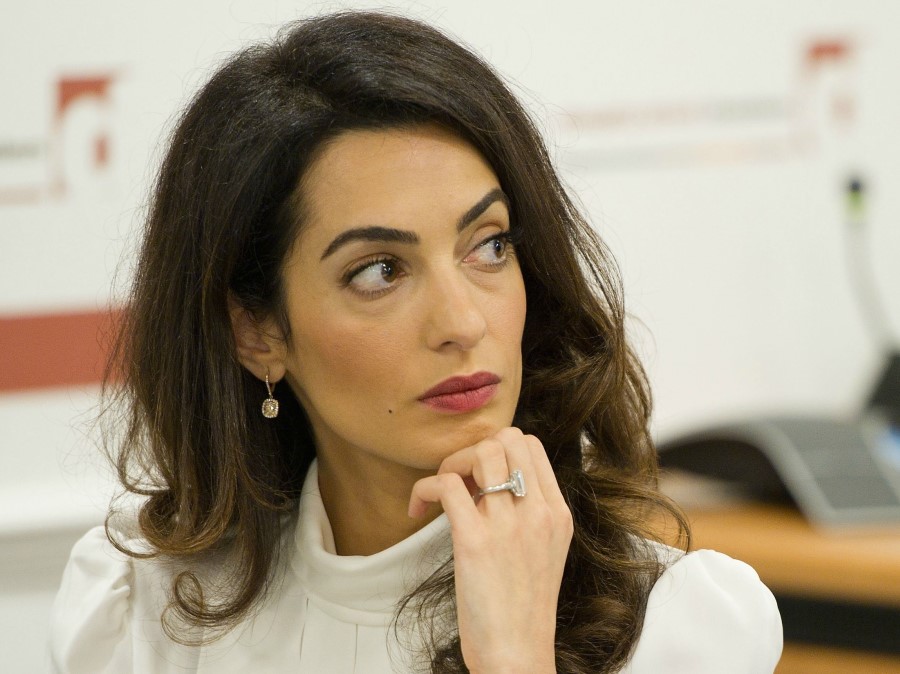Amal Clooney, the renowned human rights lawyer and activist, has become a beacon of hope in addressing global issues, including the growing concern over plastic pollution. Her dedication to advocacy and humanitarian causes has inspired millions worldwide. In this article, we will explore how Amal Clooney's efforts align with the fight against plastic waste and environmental degradation.
Plastic pollution remains one of the most pressing environmental challenges of our time. With millions of tons of plastic entering our oceans annually, it is crucial to understand the role of influential figures like Amal Clooney in driving awareness and change. Her work extends beyond the courtroom, encompassing global initiatives that tackle issues such as climate change and sustainability.
This article delves into Amal Clooney's contributions to environmental causes, focusing on her stance on plastic pollution and its implications. By exploring her advocacy strategies, we aim to provide actionable insights for individuals and organizations seeking to combat plastic waste effectively.
Read also:5 Movie Rulez Unveiling The Essential Guide To Cinematic Excellence
Table of Contents
- Biography: Amal Clooney's Journey
- Understanding Plastic Pollution
- Amal Clooney's Advocacy Efforts
- The Impact of Plastic on the Environment
- Solutions Proposed by Amal Clooney
- Collaborations and Partnerships
- Challenges in Addressing Plastic Pollution
- Raising Awareness Through Media
- Personal Actions for Change
- The Future of Plastic Reduction
Biography: Amal Clooney's Journey
Early Life and Education
Amal Clooney, born Amal Alamuddin on March 3, 1978, in Beirut, Lebanon, has a storied history that reflects her commitment to justice and equality. Her family moved to the United Kingdom during her childhood, where she excelled academically. Amal attended Oxford University, graduating with a degree in law.
Career as a Human Rights Lawyer
Amal's career as a human rights lawyer has been marked by high-profile cases involving international law, war crimes, and human rights violations. Her work has taken her across the globe, advocating for justice in some of the world's most challenging environments.
Below is a summary of Amal Clooney's personal and professional details:
| Full Name | Amal Alamuddin Clooney |
|---|---|
| Date of Birth | March 3, 1978 |
| Place of Birth | Beirut, Lebanon |
| Profession | Human Rights Lawyer, Activist |
| Education | Oxford University |
Understanding Plastic Pollution
Plastic pollution is a pervasive issue affecting ecosystems worldwide. According to the United Nations, over 11 million tons of plastic waste enter our oceans annually, threatening marine life and human health.
- Plastic pollution harms marine ecosystems.
- Microplastics have been found in drinking water and food sources.
- Current recycling efforts are insufficient to address the scale of the problem.
Amal Clooney's Advocacy Efforts
Focus on Environmental Responsibility
Amal Clooney's advocacy extends beyond traditional human rights issues to include environmental responsibility. Her work highlights the intersection of social justice and ecological preservation.
In interviews and public statements, Amal emphasizes the importance of sustainable practices. She advocates for policies that reduce plastic production and promote recycling.
Read also:7movierulztc Download 2022 Kannada The Ultimate Guide To Movies And Legal Streaming Options
The Impact of Plastic on the Environment
The environmental impact of plastic pollution is staggering. Studies indicate that plastic waste disrupts ecosystems, harms wildlife, and contributes to climate change. Amal Clooney's efforts focus on raising awareness about these consequences.
Solutions Proposed by Amal Clooney
Policy Changes and Corporate Responsibility
Amal Clooney supports legislative measures aimed at reducing plastic production. She encourages corporations to adopt sustainable practices and reduce their carbon footprint.
- Encourage governments to implement stricter regulations on plastic production.
- Advocate for corporate accountability in reducing plastic waste.
- Promote the use of biodegradable alternatives.
Collaborations and Partnerships
Amal Clooney collaborates with environmental organizations and global leaders to combat plastic pollution. These partnerships amplify her message and create a broader impact.
Key Collaborations
- United Nations Environment Programme
- Greenpeace
- World Wildlife Fund
Challenges in Addressing Plastic Pollution
Despite growing awareness, several challenges hinder efforts to reduce plastic pollution. Economic constraints, political resistance, and consumer habits all contribute to the complexity of the issue.
Raising Awareness Through Media
Amal Clooney leverages media platforms to educate the public about plastic pollution. Her involvement in documentaries, interviews, and social media campaigns amplifies the message of sustainability.
Personal Actions for Change
Individuals can contribute to reducing plastic pollution by adopting simple yet effective practices:
- Use reusable shopping bags and water bottles.
- Participate in community clean-up events.
- Support businesses committed to sustainability.
The Future of Plastic Reduction
The future of plastic reduction lies in innovation and collaboration. Amal Clooney envisions a world where sustainable practices become the norm, rather than the exception. By continuing her advocacy efforts, she inspires others to join the fight against plastic pollution.
Conclusion
Amal Clooney's work in addressing plastic pollution exemplifies her dedication to global issues. Through her advocacy, she highlights the urgency of adopting sustainable practices and reducing plastic waste. This article has explored her efforts, the challenges faced, and potential solutions to combat plastic pollution.
We invite you to take action by implementing the suggestions outlined in this article. Share your thoughts in the comments below, and consider exploring other articles on our site for further insights into environmental responsibility.
References:
- United Nations Environment Programme. (2023). Addressing Plastic Pollution.
- Greenpeace. (2023). Campaigns Against Plastic Waste.
- World Wildlife Fund. (2023). Environmental Conservation Initiatives.


